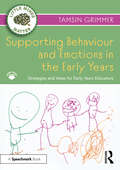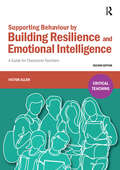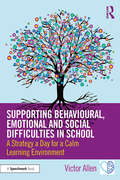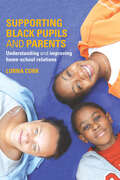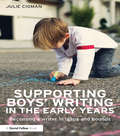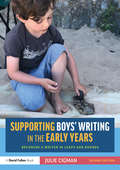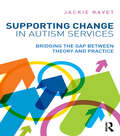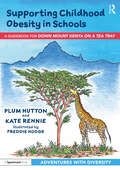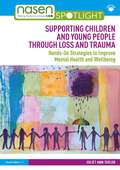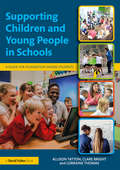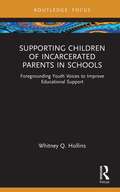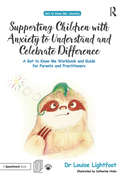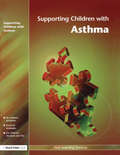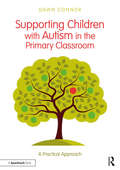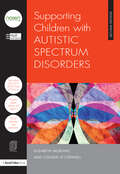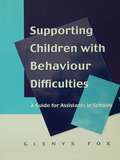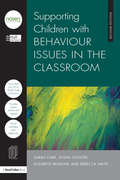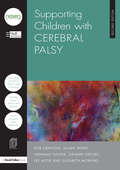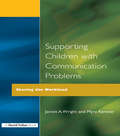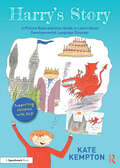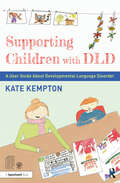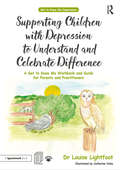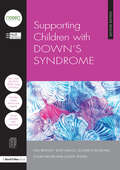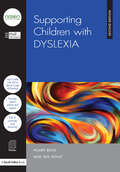- Table View
- List View
Supporting Behaviour and Emotions in the Early Years: Strategies and Ideas for Early Years Educators (Little Minds Matter)
by Tamsin GrimmerHave you ever wondered why children behave the way they do or why they can become overwhelmed with emotions so quickly? This practical resource has been created to help educators effectively support their children’s behaviour and better understand their emotions. The book focuses on the idea that all behaviour is a form of communication and explores central areas such as self-regulation and attachment, offering strategies that can be used to support challenging behaviour. Each chapter includes examples of practice, reflective questions and an activity for the reader to help consolidate their learning and encourage them to become ‘behaviour detectives’. Key topics discussed include: • Attachment theory, adverse childhood experiences and the importance of feeling safe and secure in the home and setting. • Characteristics of children during conflict situations or moments of challenging behaviour. • Developmentally appropriate expectations for children, and why it is vital that expectations are realistic. • Emotion coaching and the significance of acknowledging and validating feelings. • Linking behaviour with schematic play. Written from first-hand experience and filled with practical advice as well as recommendations for further reading and resources, Supporting Behaviour and Emotions in the Early Years is an essential read for early years educators.
Supporting Behaviour by Building Resilience and Emotional Intelligence: A Guide for Classroom Teachers (Critical Teaching)
by Victor AllenThe behaviour of students is a common concern and challenge for those working in schools. In addition there is continued government emphasis on behaviour as an important educational issue. This new and fully revised edition of Understanding and Supporting Behaviour through Emotional Intelligence is suitable for all trainees and teachers. It takes a fresh approach to the issues around behaviour with an emphasis on building learners’ resilience and developing emotional intelligence.In particular, the new edition: has been updated with the latest legislation, including Ofsted and SEND guidelines includes new research on the brain and social competence development addresses the continuing decline in social and emotional intelligence of learners emphasises strategies to build resilience includes a new section on the stages of adolescence considers a whole school approach to the issues provides new or revised case studies throughout is relevant for both primary and secondary teachers.
Supporting Behavioural, Emotional and Social Difficulties in School: A Strategy a Day for a Calm Learning Environment
by Victor AllenTeachers need to be equipped not only to teach, but also to help build mental security and wellbeing into the lives of young people and children. Supporting Behavioural, Emotional and Social Difficulties in School provides practical, relevant and proven strategies and constructive advice in order to guide teachers in this endeavour, helping them to both understand and overcome the difficulties and generational changes faced by young people and children. Containing information on topics such as classroom strategies for common issues; first impressions; and how to deal with adults, leadership and tasks such as school trips, this volume presents tried and tested strategies and shares the author’s knowledge when it comes to working in all types of schools, including primary, secondary, and pupil referral units. Not only exploring the strategies, this book also examines the reasons why a situation has arisen, and, for each piece of advice, offers an explanation for why it will work and how it affects our sense of coherence. The book also includes a short introduction to brain development at various ages, exploring the implications for children as they grow and mature, as well as examining how teachers can work with and help children through these developmental stages, assisting teachers in understanding the factors to be aware of when helping students and children develop mental security. Consolidating an understanding of mental and emotional health issues within children and young people, knowledge about cognitive brain development, and advice on what teachers can do in their classroom to make a difference, this book is essential reading for all teachers.
Supporting Black Pupils and Parents: Understanding and Improving Home-school Relations
by Lorna CorkDrawing on her extensive teaching experience, Lorna Cork explores the day-to-day needs and expectations of black parents and their children in education. Exclusion rates of black children in the UK and around the world continue to rise, highlighting that something is very wrong with the way their teaching and learning is supported in today’s schools. Focusing on contemporary situations and using real-life case studies, Cork emphasises the human consequences of the true issues behind the statistics. This topical text offers a detailed look at five key organisations that exist to support black parents. It examines their home-school interventions and discusses the central issues arising out of their efforts. The fascinating evidence offers fresh perspectives and provides much needed advice and guidance to all those seeking to improve co-operation between black families, schools and communities - all who share the goal of supporting the learning and attainment of the black child. Any education professional, student teacher, staff at an LEA, and anyone with a serious interest in race issues is sure to find this essential reading.
Supporting Boys' Writing in the Early Years: Becoming a writer in leaps and bounds
by Julie CigmanJulie Cigman uses a vast range of personal vignettes to explain best practice when encouraging boys to write. The theory is brought to life with these recollections, making this a very informative and enjoyable book to read. The ideas for working together with boys are beautifully simple and are tried and tested. This book would support both experienced practitioners and those who are just starting out, because it is so accessible and uses examples in such a delightful way - Kathy Brodie, Early Years Consultant, UKEarly Years Consultant, UK. Julie Cigman has given us a practical and principled way forward in supporting boys' writing. This book is shot through with rich examples of effective practice and deserves to be widely used. Young boys' writing is bought alive for us in these pages, and the groundedness in practice demonstrates how boys' achievement in writing can be appropriately supported from an early age. This is a book for everyone interested in promoting early literacy development. An excellent read and a practical compendium -Professor Cathy Nutbrown, School of Education, The University of Sheffield. How do we give young children a ‘writers’ voice’ and allow them to become creative and inspired writers? Supporting Boys’ Writing in the Early Years shows you how you can help boys to become confident and capable writers by supporting them to write in ways that make sense to them – on the move, outside and inside, in dens, in bushes, in mud, or sprawled on the floor dressed as superheroes. Drawing on four boys writing projects involving over 80 practitioners, the book reveals that a playful, child-centred approach can allow boys and girls to develop a writers’ voice and raise attainment in writing as well as enhancing all aspects of young children’s development. With a strong focus on observation-led assessment and planning, the book is full of practical ideas to improve the writing environment and provide writing opportunities that will be enjoyable and motivating for children. Featuring a wide range of case studies, it covers: the stages that children move through in learning to write; how you can change and develop your learning environments to give children inspiring resources and opportunities to write; helping children to find a purpose to write through their play; practical ways to create a partnership with parents that builds on their strengths as educators at home. This book will help you to create a truly enabling environment for writing and is essential reading for all those that want the children in their setting to become confident, motivated and creative writers.
Supporting Boys’ Writing in the Early Years: Becoming a Writer In Leaps and Bounds
by Julie CigmanThis second edition of Supporting Boys’ Writing in the Early Years shows how you can help boys to become confident and capable writers by supporting them to write in ways that make sense to them – on the move, outside and inside, in dens, in bushes, in mud, or sprawled on the floor dressed as superheroes. The book reveals that a playful, child-centred approach can allow boys and girls to develop a writers’ voice, raise attainment in writing and enhance all aspects of young children’s development. This new edition includes: brand new examples, case studies and photographs from over 200 recent early writing projects; up-to-date references fully in line with the latest Early Years Foundation Stage (EYFS) documentation; a response to the increased focus in schools on handwriting, in particular on cursive handwriting; a questioning of the place of objective-led print in the classroom and a recommendation that environmental print should reflect learning rather than teaching; imaginative ideas for developing oral and written storytelling; a consideration of some of the ways in which challenging active play, such as superhero and weapon play, can be channelled into playful writing; a greater discussion and challenging of the emphasis placed on outcomes, over the process of learning and development. Supporting Boys' Writing in the Early Years will help you to create a truly enabling environment for writing and supports the belief that writing experiences should be EPIC: Everywhere, Playful and Purposeful, Inspirational and Contextualised. It is an essential read for all practitioners who want the children in their setting to flourish as motivated and creative writers.
Supporting Change in Autism Services: Bridging the gap between theory and practice
by Jackie RavetSupporting Change in Autism Services explores the theoretical and practical dimensions of improving service provision for children, young people and adults with autism. The core aim of the book is to identify and critically examine some of the key factors that either facilitate or inhibit the implementation of good autism practice at both practitioner level and workplace level. It shows practitioners and students how to successfully translate autism theory into practice across service contexts and showcases a range of practitioner case studies throughout the text in order to illustrate effective implementation.? Topics explored include: controversies and ambiguities in autism policy, theory and discourse; understanding autism in an inclusive context; enabling participation; making sense of behaviour; autism and interprofessionalism; strategic planning for autism friendly services; bridging the implementation gap. This book is essential reading for anyone interested in improving services for people with autism in the education, social care, health and voluntary sectors.
Supporting Childhood Obesity in Schools: A Guidebook for 'Down Mount Kenya on a Tea Tray' (Adventures with Diversity)
by Plum Hutton Kate RennieThis guidebook, designed to be used alongside the storybook Down Mount Kenya on a Tea Tray, has been created to inform readers about the physical, social and psychological impacts of childhood obesity. Created for busy parents, teachers and professionals, this book is founded upon recent research and written in an engaging and accessible style. Chapters explain the surprisingly complex causes of childhood obesity and highlight that children often have little control over the factors that may lead them to become obese. The physical and psychological consequences of obesity are explored and strategies suggested, ranging from individual and family support to changes that need to be made at a societal level to tackle this significant public health issue. Key features include: • an accessible guide to childhood obesity • chapter-by-chapter discussion points for use with Down Mount Kenya on a Tea Tray to encourage open and honest conversations about childhood obesity and its effects • strategies to support obese children and their families to sustain positive lifestyle changes. This is an essential resource for parents, teachers and other professionals looking to understand childhood obesity and support children aged 8–12.
Supporting Children and Young People Through Loss and Trauma: Hands-On Strategies to Improve Mental Health and Wellbeing (nasen spotlight)
by Juliet Ann TaylorLoss and trauma impacts families, communities and children and young people. This includes "collective trauma" experienced within situations such as a global pandemic, economic poverty, displacement, war, natural hazards or political turmoil. As a result, various common characteristics may be exhibited by children in school settings.This practical book provides strategies and interventions to support the effects of loss and trauma in children and young people. It offers easy-to-understand research and theory to develop knowledge and skills, alongside hands-on strategies to support emotional responses, with practical examples of "what to do if…." Chapters consider why and how these emotions occur, recognising each child's life experiences, and focus on identifying suitable approaches. The intention is to validate feelings and help each child find a way to navigate the variety of emotions experienced, using the simple "5S-Scaffold" model: SUBSIDE–SOOTHE–SUPPORT–STRENGTHEN–SELF-CARE.With a wealth of information and additional downloadable resources, Supporting Young People Through Loss and Trauma is essential reading for teachers, senior leaders, mental health or behaviour leads and SENDCos.
Supporting Children and Young People in Schools: A Guide for Foundation Degree Students
by Lorraine Thomas Allison Tatton Clare BrightThis book explores the diverse ways in which practitioners can support students’ learning, enabling them to develop and flourish in the school setting. Chapters bring together various theoretical approaches, draw on case studies from practice and foreground the concrete ways in which practitioners might respond to the specific needs of children. Maintaining a strong link with current policy and curricula, each chapter takes a detailed and nuanced approach to a different aspect of pupil support, whilst reflective questions, activities and suggestions for further reading encourage the reader to reflect, re-consider and delve deeper into key topics. Areas addressed include: theories of child and adolescent development managing student behaviour and building positive relationships working with pupils with special educational needs making use of assessment and evaluation furthering professional skills and career progression. An accessible yet comprehensive guide to a wide range of key issues, this book will provide Foundation Degree students, teaching assistants and practitioners working in a range of educational settings with essential support as they progress from study into practice.
Supporting Children and Young People with Anxiety: A Practical Guide
by Elizabeth Herrick Barbara Redman-WhiteThis accessible and user-friendly resource will help a wide range of adults support children and young people with anxiety. Clear information on the nature of anxiety is combined with helpful ideas, practical strategies and resources to help adults feel confident in understanding and managing the emotional well-being of children and young people. Supporting Children and Young People with Anxiety cuts through the literature and provides practical support based on sound psychological theory and evidence-based practice. Intervention programmes and suggested strategies have been tried and tested in schools and colleges, with young people and families, and can be adapted for use with groups, individual children or parents. Presuming no prior experience on the part of the reader, the authors acknowledge the challenges involved in recognising anxiety and delivering tailored treatment, and emphasise the role of prevention and early intervention. All resources are provided as photocopiable and downloadable resources which can be easily customised for use with children and parents. This essential text will prove an invaluable resource for worried parents, students, teachers and carers, enabling them to soothe, support and empower the young people in their care.
Supporting Children of Incarcerated Parents in Schools: Foregrounding Youth Voices to Improve Educational Support (Routledge Research in Educational Equality and Diversity)
by Whitney Q. HollinsDrawing on qualitative research conducted with young people in New York, this volume highlights the unique experiences of children of incarcerated parents (COIP) and counters deficit-based narratives to consider how young people’s voices can inform and improve educational support services. Supporting Children of Incarcerated Parents in Schools combines the author’s original research and personal experiences with an analysis of existing scholarship to provide unique insight into how COIP experience schooling in the United States. With a focus on the benefits of qualitative research for providing a more nuanced portrayal of these children and their experiences, the text foregrounds youth voices and emphasizes the resilience, maturity, and compassion which these young people demonstrate. By calling attention to the challenges that COIP face in and out of school, and also addressing associated issues around race and racism, the book offers large and small-scale changes that educators and other allies can use to better support children of incarcerated parents. This volume will be of interest to scholars and researchers interested in the sociology of education, race and urban education, and the impacts of parental incarceration specifically. It will also be of benefit to educators and school leaders who are supporting young people affected by these issues.
Supporting Children with Anxiety to Understand and Celebrate Difference: A Get to Know Me Workbook and Guide for Parents and Practitioners (Get To Know Me)
by Louise LightfootThe ‘Get to Know Me’ resources aim to support children, with those around them, who may have additional/special educational needs. They are designed to empower the professionals and adults who support those with identified needs. Developed by child psychologist Dr Louise Lightfoot, the series includes activities specific to anxiety, depression and Obsessive Compulsive Disorder (OCD). In supporting the social and emotional health of students, it equips them with the ability to thrive, personally and academically. This book has been created for key adults (teachers, therapists and parents) as a complement to the picture book and draw along versions of Sammy Sloth – a traditional narrative story exploring thoughts, feelings and sensations experienced by many children with anxiety. The activities in this book offer practical tools and strategies to support the child and those around them in addition to the information specific to the condition to improve understanding of a child’s needs to promote empathy and acceptance. Picture book and draw along versions of Sammy Sloth are available separately, and as part of the Get to Know Me: Anxiety set.
Supporting Children with Asthma
by Hull Learning ServicesOff-the-shelf support containing all the vital information practitioners need to know about Asthma, this book covers: * What to do if a pupil has an attack * Staff responsibility and school policy * Subject specific do's and don'ts * Specialist careers advice
Supporting Children with Autism in the Primary Classroom: A Practical Approach
by Dawn ConnorThis invaluable resource offers a wealth of strategies enabling you to support children with autism in the mainstream classroom. Cutting through the jargon and recognising the huge variety of ways in which children’s perceptions, feelings and behaviours may be affected by autism, the text is packed with practical advice to help you create a classroom environment which will meet the needs of the individual child. Each chapter in the book addresses some of the most common social, practical and behavioural difficulties that a child with autism may face at school, and details tried and tested approaches for improving their experiences and outcomes in your classroom. Topics discussed include: classroom layout, timetables and rules effective communication supporting learning and setting targets breaks, unstructured times and school trips challenging behaviours Supporting Children with Autism in the Primary Classroom – A Practical Approach is a highly accessible resource which will give primary teachers, teaching assistants, SENCOs, and parents, the confidence and knowledge they need to support young children with autism.
Supporting Children with Autistic Spectrum Disorders (21st Century Business Management)
by Hull City CouncilThis practical resource contains a wealth of valuable advice and tried-and-tested strategies for identifying children and young people with Autistic Spectrum Disorders (ASD). This fully updated text describes the different types of difficulties experienced by pupils with ASD and helps practitioners to understand their diverse needs. This fully updated new edition explores key topics, including: organizing the classroom and support staff home-school liaison and working with siblings transition to adulthood independence skills whole school implications. Now fully updated in line with the SEND 2014 Code of Practice, this invaluable guide provides guidance and practical strategies for teachers and other professionals, helping them to feel more confident, and be more effective in supporting learners in a variety of settings. For professional development, this book also provides materials for in-house training sessions, and features useful checklists, templates and photocopiable/downloadable resources.
Supporting Children with Behaviour Difficulties: A Guide for Assistants in Schools
by Glenys FoxThis practical guide is written to help assistants in supporting children who have behavior difficulties. The author provides a description of the role of the assistant in working with the class teacher to enable children to learn good behavior in schools, a clear description of the range of behavior difficulties, and information on strategies that work in managing behavior. The book is relevant and useful for any assistant working directly with children, as all assistants in the course of their work need to develop a repertoire of effective strategies for managing behavior. It is particularly helpful for assistants who work routinely with children who present behavior problems as it guides understanding and provides a helpful framework for knowing where to start, what to do and how to do it. The book is also an invaluable resource in the training of assistants.
Supporting Children with Behaviour Issues in the Classroom
by Hull City CouncilThis completely revised edition is an easy to use resource for teachers, TAs and SENCOs concerned about behavioural issues in the classroom. It will support school staff in their approach to a range of behavioural issues, through a range of tried-and-tested strategies, including: How to create an environment of support and acceptance Techniques to provide an effective leaning environment Ways in which to communicate clearly with children with poor communication skills Whole class and whole school approaches for a positive learning environment How to maintain appropriate behaviours during unstructured break times This accessible reference tool will help any teacher to create and maintain a classroom environment conducive to learning. Packed with resources, it also includes templates and example Personal Support Plans, written by practitioners for practitioners.
Supporting Children with Cerebral Palsy (nasen spotlight)
by Hull City CouncilCompletely revised and fully updated in light of the 2014 SEND Code of Practice, this edition familiarises readers with the specific learning needs of cerebral palsy. Offering practical tips and tried-and-tested strategies from professional practitioners, this accessible guide provides advice on how to meet the needs of young people with cerebral palsy. This new edition presents all of the information practitioners will need to know to deliver outstanding provision for young people with cerebral palsy and support the inclusion of children and young people with cerebral palsy into mainstream schools. The far-reaching advice found within this guide includes: Planning for a pupil with cerebral palsy Accessing the curriculum, including specific advice on each subject area How to make effective use of support staff Developing independence skills Liaising between home and school Making the transition into adulthood With accessible materials, such as checklists, templates and photocopiable resources, this up-to-date guide will enable teachers and other professionals to feel more confident and effective in the support they can provide.
Supporting Children with Communication Problems: Sharing the Workload
by Myra Kersner Jannet A. WrightFirst Published in 1998. Routledge is an imprint of Taylor & Francis, an informa company.
Supporting Children with DLD: A Picture Book and User Guide to Learn About Developmental Language Disorder (Supporting Children with DLD)
by Kate KemptonThis picture book and guidebook set has been developed to help raise awareness of Developmental Language Disorder, and to highlight the impact of DLD from the child’s point of view. Harry’s Story introduces a child who faces daily challenges in school due to his language difficulties. It explores how these challenges are made easier by his teachers’ understanding and support as he finds new ways to communicate. Supporting Children with DLD provides essential information, prompts and suggestions for adults to help understand the experience of children with DLD. It offers supportive strategies and activities to help children express themselves effectively and ask for help when they need it. This resource can be used both directly with the child, to talk about and explore DLD, and also as a training tool with the parents and professionals who support them. With research suggesting an average of two children per classroom are affected by DLD, this is an essential set for parents and professionals looking to understand the condition.
Supporting Children with DLD: A User Guide About Developmental Language Disorder (Supporting Children with DLD)
by Kate KemptonFor effective use, this book should be purchased alongside the illustrated picture book Harry’s Story. Both books can be purchased together as a set, Supporting Children with DLD: A Picture Book and User Guide to Learn About Developmental Language Disorder [978-0-367-70920-4]. Supporting Children with DLD, has been developed to help raise awareness of Developmental Language Disorder, and to highlight the impact of the condition from the child’s point of view. With activities, prompts and sample questions, this is an essential resource to enable adults to understand the reality of living with DLD, helping children feel heard and respected, as well as providing a solid foundation for tailoring support to individual needs. Drawing on specific examples from Harry’s Story, the book does not assume any prior knowledge of DLD and is designed to offer the reader accessible information and practical advice, teaching as you go. This book: Highlights the link between spoken and written language, addressing the need to recognise the literary difficulties faced by children with DLD Provides practical activities and worksheets that can be used to help children express themselves and ask for help Offers strategies for supporting children’s understanding of language, based on common situations and experiences explored in Harry’s Story Written to be an accessible introduction to DLD and its effect on children’s lives, this is an essential resource for parents and professionals looking to understand the condition.
Supporting Children with Depression to Understand and Celebrate Difference: A Get to Know Me Workbook and Guide for Parents and Practitioners (Get To Know Me)
by Louise LightfootThe ‘Get to Know Me’ resources aim to support children, with those around them, who may have additional/special educational needs. They are designed to empower the professionals and adults who support those with identified needs. Developed by child psychologist Dr Louise Lightfoot, the series includes activities specific to anxiety, depression and Obsessive Compulsive Disorder (OCD). In supporting the social and emotional health of students, it equips them with the ability to thrive, personally and academically. This book has been created for key adults (teachers, therapists and parents) as a complement to the picture book and draw along versions of Silver Matilda – a traditional narrative story exploring thoughts, feelings and sensations experienced by many children with depression. The activities in this book offer practical tools and strategies to support the child and those around them in addition to the information specific to the condition to improve understanding of a child’s needs to promote empathy and acceptance. Picture book and draw along versions of Silver Matilda are available separately, and as part of the Get to Know Me: Depression set.
Supporting Children with Down's Syndrome (nasen spotlight)
by Hull City CouncilThis practical resource contains a wealth of valuable advice and tried-and-tested strategies for supporting children and young people with Down’s Syndrome. Fully updated with the 2014 SEND Code of Practice, this text describes the different types of difficulties experienced by pupils with Down’s Syndrome and helps practitioners to understand their diverse needs. The wide-ranging chapters explore a variety of topics, including: Defining the profile of a pupil with Down’s Syndrome Guidelines for working with pupils Addressing behaviour issues The use of ICT Home/school liason Assessment It provides guidance and practical strategies for SENCOs, teachers and other professionals and parents, helping them to feel more confident, and be more effective in supporting learners in a variety of settings. It also provides materials for in-house training sessions, and features useful checklists, templates and photocopiable resources.
Supporting Children with Dyslexia (nasen spotlight)
by Hull City CouncilCompletely revised and updated in light of the new 2014 SEND Code of Practice, this second edition of Supporting Children with Dyslexia provides valuable advice and resources for teachers, TAs and SENCOs supporting pupils on the dyslexic spectrum. This practical resource will help those who are looking for expert guidance and strategies, as well as providing a professional development tool which will encourage outstanding practice at all levels. Spanning pre-school, primary and secondary teaching, this book covers the key areas to be considered when supporting pupils with dyslexia, including: how to identify a young person with dyslexia practical strategies for pre-school, primary and secondary settings useful advice to give to parents and carers of children and young people with dyslexia useful materials for continual professional development. Featuring helpful checklists, templates and photocopiable resources, this book provides guidance and practical strategies for identifying and supporting young people with dyslexia that will be of use to teachers, TAs, SENCOs and other educational professionals.
